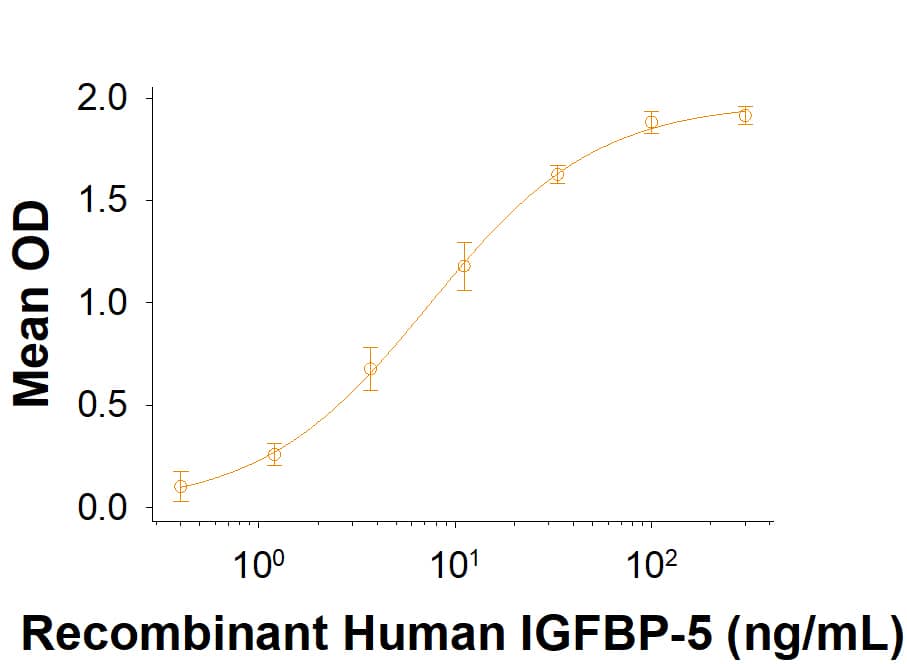Recombinant Human DHFR Protein, CF Summary
Product Specifications
Met1-Asp187, with a C-terminal 6-His tag
Analysis
Customers also Viewed
Product Datasheets
Carrier Free
CF stands for Carrier Free (CF). We typically add Bovine Serum Albumin (BSA) as a carrier protein to our recombinant proteins. Adding a carrier protein enhances protein stability, increases shelf-life, and allows the recombinant protein to be stored at a more dilute concentration. The carrier free version does not contain BSA.
In general, we advise purchasing the recombinant protein with BSA for use in cell or tissue culture, or as an ELISA standard. In contrast, the carrier free protein is recommended for applications, in which the presence of BSA could interfere.
8456-DR
| Formulation | Supplied as a 0.2 μm filtered solution in Tris, NaCl, Glycerol, Brij-35 and DTT. |
| Shipping | The product is shipped with polar packs. Upon receipt, store it immediately at the temperature recommended below. |
| Stability & Storage: | Use a manual defrost freezer and avoid repeated freeze-thaw cycles.
|
Assay Procedure
- Assay Buffer: 50 mM MES, 25 mM Tris, 100 mM NaCl, 25 mM Ethanolamine, 2 mM DTT
- Recombinant Dihydrofolate Reductase/DHFR (rhDHFR) (Catalog # 8456-DR)
- beta -Nicotinamide adenine dinucleotide phosphate reduced, tetrasodium salt ( beta -NADPH) (Sigma, Catalog # N7505), 10 mM stock in deionized water
- Dihydrofolic acid (DHF) (Sigma, Catalog # D7006), 10 mM stock in Assay Buffer + 4.5 mM NaOH
- 96-well Clear Plate (Catalog # DY990)
- Plate Reader (Model: SpectraMax Plus by Molecular Devices) or equivalent
- Dilute rhDHFR to 1 μg/mL in Assay Buffer.
- Prepare a Substrate Mixture containing 0.2 mM DHF and 0.25 mM beta -NADPH in Assay Buffer.
- Load 50 μL of 1 μg/mL rhDHFR into a plate, and start the reaction by adding 50 μL of Substrate Mixture. Include a Substrate Blank containing 50 μL of Assay Buffer and 50 μL of Substrate Mixture.
- Read at an absorbance of 339 nm in kinetic mode for 5 minutes.
- Calculate specific activity:
|
Specific Activity (pmol/min/µg) = |
Adjusted Vmax* (OD/min) x well volume (L) x 1012 pmol/mol x (-1) |
| ext. coeff** (M-1cm-1) x path corr.*** (cm) x amount of enzyme (µg) |
*Adjusted for Substrate Blank
**Using the extinction coefficient 6220 M-1cm-1
***Using the path correction 0.32 cm
Note: the output of many spectrophotometers is in mOD. Per Well:
- rhDHFR: 0.05 μg
- DHF: 0.1 mM
- beta -NADPH: 0.125 mM
Background: Dihydrofolate Reductase/DHFR
Dihydrofolate Reductase (DHFR) is an approximately 21 kDa enzyme that catalyzes the NADPH-dependent reduction of dihydrofolate to tetrahydrofolate, which is crucial for the synthesis of purines, thymidylate, and certain amino acids (1-4). Structurally, DHFR consists of an eight-stranded beta -sheet and four alpha -helices (2). Human DHFR shares 90% amino acid identity with mouse and rat DHFR. In addition to acting as a cofactor, NADPH protects DHFR from degradation in vitro and in a cellular context (5-8). DHFR protein binds to its own mRNA to self-regulate translation (9-12). The enzymatic activity and subcellular localization of DHFR are at least partially regulated by post-translational modification. Mono-ubiquitination of DHFR by MDM2 reduces the activity of DHFR (13). DHFR is primarily cytoplasmic, but it has been shown to translocate to the nucleus in a SUMO-dependent manner (14). Due to its role in nucleotide biosynthesis, DHFR has long been a therapeutic target for the treatment of various cancers and infectious diseases (15, 16).
- Bertino, J.R. et al. (1965) Biochemistry 4:839.
- Schweitzer, B.I. et al. (1990) FASEB J. 4:2441.
- Fierke, C.A. et al. (1987) Biochemistry 26:4085.
- Abali, E.E. et al. (2008) Vitam. Horm. 79:267.
- Perkins, J.P. et al. (1967) J. Biol. Chem. 242:4771.
- Wallace, L.A. and C. Robert Matthews (2002) J. Mol. Biol. 315:193.
- Ainavarapu, S.R. et al. (2005) Biophys. J. 89:3337.
- Hsieh, Y.C. et al. (2013) Mol. Pharmacol. 83:339.
- Chu, E. et al. (1993) Biochemistry 32:4756.
- Ercikan, E. et al. (1993) Adv. Exp. Med. Biol. 338:537.
- Ercikan-Abali, E.A. et al. (1997) Biochemistry 36:12317.
- Tai, N. et al. (2004) Biochem. J. 378:999.
- Maguire, M. et al. (2008) Cancer Res. 68:3232.
- Anderson, D.D. et al. (2007) Clin. Chem. Lab. Med. 45:1760.
- Goldman, I.D. et al. (2010) Curr. Opin. Investig. Drugs 11:1409.
- Sharma, M. and P.M. Chauhan (2012) Future Med. Chem. 4:1335.
FAQs
No product specific FAQs exist for this product, however you may
View all Proteins and Enzyme FAQsReviews for Recombinant Human DHFR Protein, CF
There are currently no reviews for this product. Be the first to review Recombinant Human DHFR Protein, CF and earn rewards!
Have you used Recombinant Human DHFR Protein, CF?
Submit a review and receive an Amazon gift card.
$25/€18/£15/$25CAN/¥75 Yuan/¥2500 Yen for a review with an image
$10/€7/£6/$10 CAD/¥70 Yuan/¥1110 Yen for a review without an image









